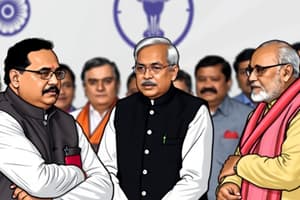Podcast
Questions and Answers
Which level of government is primarily responsible for regulating interstate commerce?
Which level of government is primarily responsible for regulating interstate commerce?
- Local government
- Federal government (correct)
- County government
- State government
A state government decides to implement a new program aimed at improving public transportation. From which source is the state least likely to receive funding for this initiative?
A state government decides to implement a new program aimed at improving public transportation. From which source is the state least likely to receive funding for this initiative?
- Income taxes collected from residents
- Property taxes levied on real estate
- Direct contributions from foreign governments (correct)
- Sales taxes generated within the state
In a political debate, a candidate argues for minimal government intervention in the economy and a return to traditional family values. This stance aligns most closely with:
In a political debate, a candidate argues for minimal government intervention in the economy and a return to traditional family values. This stance aligns most closely with:
- Socialism
- Policy conservatism (correct)
- Policy liberalism
- Anarchism
Imagine a scenario where the federal government mandates that all states adopt a specific set of environmental regulations, but provides no financial assistance to implement them. This is an example of:
Imagine a scenario where the federal government mandates that all states adopt a specific set of environmental regulations, but provides no financial assistance to implement them. This is an example of:
The idea that states can experiment with different policies, providing a testing ground for potential national reforms, is often referred to as states being:
The idea that states can experiment with different policies, providing a testing ground for potential national reforms, is often referred to as states being:
A state law conflicts with a federal law regarding environmental regulations. Which principle dictates that the federal law will take precedence?
A state law conflicts with a federal law regarding environmental regulations. Which principle dictates that the federal law will take precedence?
Which of the following powers is not typically reserved for the federal government according to the U.S. Constitution?
Which of the following powers is not typically reserved for the federal government according to the U.S. Constitution?
The Supreme Court case McCulloch v. Maryland (1819) is significant because it:
The Supreme Court case McCulloch v. Maryland (1819) is significant because it:
Which of the following scenarios BEST exemplifies the political culture prevalent in Texas?
Which of the following scenarios BEST exemplifies the political culture prevalent in Texas?
A rapidly growing city in Texas with a population exceeding 5,000 seeks greater autonomy in its governance. Under what provision can this city achieve self-governance with reduced state oversight?
A rapidly growing city in Texas with a population exceeding 5,000 seeks greater autonomy in its governance. Under what provision can this city achieve self-governance with reduced state oversight?
In a Texas city, a controversial decision is made to rezone a residential area for commercial development, leading to displacement of some residents. Which concept allows the city government to take private property for public use, provided fair compensation is offered?
In a Texas city, a controversial decision is made to rezone a residential area for commercial development, leading to displacement of some residents. Which concept allows the city government to take private property for public use, provided fair compensation is offered?
After a natural disaster, the federal government provides funding to Texas to assist with recovery efforts, but mandates that the state must adhere to specific environmental regulations in the rebuilding process. This scenario BEST exemplifies which type of federalism?
After a natural disaster, the federal government provides funding to Texas to assist with recovery efforts, but mandates that the state must adhere to specific environmental regulations in the rebuilding process. This scenario BEST exemplifies which type of federalism?
A Texas community seeks to improve its local schools, provide better access to clean water, and enhance public transportation. Which type of entity is typically responsible for providing these specific services?
A Texas community seeks to improve its local schools, provide better access to clean water, and enhance public transportation. Which type of entity is typically responsible for providing these specific services?
What was the primary focus of the 1876 version of the Texas Constitution, influencing the state's political landscape for years to come?
What was the primary focus of the 1876 version of the Texas Constitution, influencing the state's political landscape for years to come?
A group of citizens believes that the Texas Constitution should include stronger environmental protections. What is the process for amending the Texas Constitution to include these?
A group of citizens believes that the Texas Constitution should include stronger environmental protections. What is the process for amending the Texas Constitution to include these?
In the city of Austin, the city council hires a professional to oversee the daily administrative operations, implement policies, and manage city departments. Which type of city government structure does Austin employ?
In the city of Austin, the city council hires a professional to oversee the daily administrative operations, implement policies, and manage city departments. Which type of city government structure does Austin employ?
Flashcards
Federal policy responsibilities?
Federal policy responsibilities?
National defense, foreign policy, interstate commerce.
State policy responsibilities?
State policy responsibilities?
Education, transportation, public health, law enforcement.
Local policy responsibilities?
Local policy responsibilities?
Zoning, public safety (police/fire), local transportation, sanitation.
Policy conservatism?
Policy conservatism?
Signup and view all the flashcards
Policy liberalism?
Policy liberalism?
Signup and view all the flashcards
States as 'laboratories of democracy'?
States as 'laboratories of democracy'?
Signup and view all the flashcards
Enumerated powers?
Enumerated powers?
Signup and view all the flashcards
Implied powers?
Implied powers?
Signup and view all the flashcards
County Functions
County Functions
Signup and view all the flashcards
Special Districts
Special Districts
Signup and view all the flashcards
At-large Elections
At-large Elections
Signup and view all the flashcards
Texas Political Culture
Texas Political Culture
Signup and view all the flashcards
Texas Constitution Amendment
Texas Constitution Amendment
Signup and view all the flashcards
Evolution of Federalism
Evolution of Federalism
Signup and view all the flashcards
Eminent Domain
Eminent Domain
Signup and view all the flashcards
Home Rule
Home Rule
Signup and view all the flashcards
Study Notes
- Different levels of government handle specific policies.
- National defense, foreign policy, and interstate commerce fall under federal authority.
- Education, transportation, public health, and law enforcement are state responsibilities.
- Local governments manage zoning, public safety, local transportation, and sanitation.
- Federal policies are "big picture," state policies cover "public services," and local policies are "community-focused."
- Policy conservatism favors limited government, traditional values, and lower taxation.
- Policy liberalism supports active government, social programs, and economic regulation.
- State and local governments generate revenue from taxes, fees, and federal grants.
- Federalism divides power between national and state governments.
- A unitary system concentrates power in the central government.
- A confederation is a loose alliance of independent states.
- States are called "laboratories of democracy" because they can experiment with policies.
- Nullification is the idea that states can invalidate federal laws.
- Enumerated powers are specifically listed for the federal government in the U.S. Constitution.
- Implied powers are necessary to carry out enumerated powers.
- The 10th Amendment reserves powers not given to the federal government for the states or the people.
- Marbury v. Madison (1803) established judicial review.
- McCulloch v. Maryland (1819) strengthened federal power through implied powers.
- Federal grants-in-aid are important because they provide states with funding.
- Mandates are federal requirements imposed on states.
- Preemption occurs when federal law overrides state law.
- State constitutions typically contain a bill of rights, government structure, and detailed policies.
- Constitutionalism means that government operates within a legal framework.
- State constitutions are long because they include detailed policies and amendments.
- Local governments derive their power from state constitutions and laws.
- Most states amend their constitution through proposal and voter approval.
- Counties handle law enforcement, courts, and record-keeping.
- Cities manage zoning, utilities, and emergency services.
- Special districts provide specific services.
- At-large elections have representatives serving the entire jurisdiction.
- Single-member district elections have representatives serving a specific district.
- Moralistic political culture favors active government.
- Individualistic political culture favors limited government.
- Traditionalistic political culture favors the status quo.
- Texas's political culture blends individualistic and traditionalistic elements.
- The current Texas Constitution favors limited government and strong local control.
- The 1876 Texas Constitution focused on decentralization.
- The Constitutional Convention of 1875 emphasized retrenchment and reform.
- The Texas Bill of Rights includes additional rights compared to the U.S. Constitution.
- Texas was allowed to keep public lands and split into five states when it joined the U.S.
- Amending the Texas Constitution requires proposal by legislature and voter approval.
- Amending the U.S. Constitution requires Congress approval and state ratification.
- Federalism has shifted from dual federalism to cooperative federalism.
Types of Federalism
- Dual Federalism features clear separation of powers.
- Cooperative Federalism involves shared responsibilities.
- Fiscal Federalism involves the use of grants.
- New Federalism aims to return power to the states.
- Mayor-Council governments have an elected mayor and council.
- Council-Manager governments have a council that hires a city manager.
- The 16th Amendment allowed federal income tax.
- The 17th Amendment allowed direct election of U.S. Senators.
- Radical Republicans pushed for strict Reconstruction and civil rights.
- A city charter defines city government powers.
- Eminent domain allows government to take private property for public use with compensation.
- Home rule allows cities over 5,000 to govern themselves with fewer state restrictions.
Studying That Suits You
Use AI to generate personalized quizzes and flashcards to suit your learning preferences.
Description
Explore policy responsibilities at federal, state, and local levels. Understand policy conservatism's limited government approach versus policy liberalism's active government stance. Learn about revenue sources and the dynamics of federalism.




